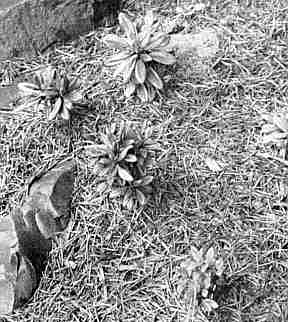A Plant of the R. roxieanum Subseries (Rh. 94)
By Rudolph Henny

|
|
Fig. 10 An idea of the size of these plants
can be obtained by comparing with the fir needle mulch. |
Possibly one of the slowest growing plants of the entire Rock 1949 expedition is listed under
roxieanum
subseries (R.94) This group of plants though somewhat varied in habit of growth has several members that are hardly more than two inches in height and about the same in breadth. All of the plants are now seven years old, and since most members of the taliense series are slow to bloom none have to this day borne any flowers. The aforementioned fact would of course, make positive identification difficult, and will not be attempted here.
Apart from the several somewhat larger growing and evidently allied members of the group (R. 94) the tiny growing plants are by far the most interesting. These plants seem perfectly happy, and are not in a so called long process of slow dying that often afflicts members of the
R. repens
and
sanguineum
series. Members of that group will actually get smaller for a year or two, and then eventually, due to an unhappy situation, die. The small plants of R.94 make less than one half inch of growth a year, have fine green foliage that is covered on the underside with a very thick velvety, rust colored indumentum, and appear healthy. The illustration (Fig. 10) shows one of these plants about 2½ inches in height planted from seed in 1950. The foliage is almost piled since it is so thick due to the actual slow growth of the plant.
As mentioned earlier none of this group has bloomed to date and by just looking at the plants I am of the opinion that many years will elapse before they do, but reading on page 666b of the "Species Rhododendron" Ward states writing of an allied member of the taliense series
R. recurvoides
and referring to 2-3 foot plants.
"Quite tiny plants have been a mass of flowers, which are borne in trusses of 4-7 very freely."